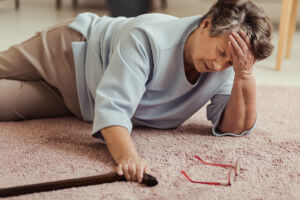CHICAGO, IL – Putting your loved one in a long-term care facility is a tough decision for anyone to make. Many people worry the quality of care their loved one will receive from nursing homes and what is going on behind closed doors. Unfortunately, issues such as understaffing and inadequate staff training have led to nursing home neglect in facilities across the country. When nursing home staff acts negligently or the facility is not equipped with appropriate safety measures, serious fall accidents are more likely to occur.
Falling is Often Catastrophic or Deadly for Elderly or Disabled Residents
According to the Centers for Disease Control and Prevention (CDC), one in four Americans aged 65 and older have a fall each year. In 2018 alone, approximately 36 million falls were reported among seniors. Of those, more than 8 million required medical attention for at least one day; shockingly, more 32,000 elders died from the fall and the injuries they sustained.
Some falls may only result in bruising or abrasions; however, other falls may result in broken bones, traumatic brain injuries, spine injuries, or even death.
Those who suffer from an impairment like Alzheimer’s or dementia, or arthritis, diabetes, anemia, impaired sight or hearing, and neuropathy are a greater fall risk than those without these conditions.
How Nursing Homes Can Prevent Fall Injuries
There are many precautions that can be taken to prevent fall injuries from occurring; however, some of the best ways to prevent nursing home falls include:
- Nursing home staff should always be attentive towards residents. Proper equipment should be made available to residents who require extra assistance. These residents should always receive the proper foot care, shoes, and appropriate walking aides.
- All staff members should be trained on fall prevention strategies, as well as the risks involved when a resident suffers a fall.
- Every resident should have a completed risk assessment which includes all past accidents and falls, medications taken, and general physical health. Risk assessments identify which residents are high risks for falls, develop interventions to prevent falls, discuss at-risk residents and modify changes in care plan, and carry out investigations, including root cause analysis, when a fall occurs.
- Nursing homes should never have any environmental hazards, and if they do, should be removed immediately. Environmental hazards in nursing home facilities include: poor lighting, slippery floors, debris in walkways, improper exit signs, improperly maintained or fitted wheelchairs, incorrect bed height, broken equipment, and more.
- Nursing homes should carefully avoid incorrect bed heights and faulty bed rails. Faulty bed rails and incorrect bed heights account for nearly 30 percent of nursing home falls nationwide.
- Exercise programs, including stretching, physical therapy, and balance should be available for all residents. Statistics show that although exercises may not help with preventing falls, it will help improve strength and balance which can lessen injuries if a fall were to occur.
How A Fall Injury Can Impact a Nursing Home Resident’s Life
Suffering from a fall can change a senior’s life. Some negative consequences of a fall occurring can include:
Robbing a person of mobility and independence: A person who was once able to walk around on their own may now have to use a cane, walker, or wheelchair to get around. A resident may also become less active because they are afraid.
A person can fracture a leg, hip, or other bone in a fall: If they try to break their fall, they may break an arm or wrist in the process. If they hit their head while suffering a fall, it could result in traumatic brain injury.
A fall can cause an elderly person to undergo surgery: Surgery opens the door of many potential complications, such as surgical infections or blood clots.
Long recuperation and painful physical therapy: Older people heal much more slowly when trying to recover from an injury. When a person suffers a severe injury, they will likely have a lengthy recovery time that often involves physical therapy.
Less mobility: Less mobility puts a person at a much higher risk of developing pneumonia, bed sores, and other health complications. Initially, the patient will be lying in bed much more while recovering, so staff members must be vigilant to prevent these issues.
What to do If You Suspect Your Loved One Has Sustained a Fall Injury
A nursing home may be held liable for a fall accident if staff members acted negligently, or the nursing home was not kept in a reasonably safe condition which resulted in your loved ones fall. If you suspect that your loved one’s fall was caused by nursing home negligence, contact the attorney’s of Dinizulu Law Group. Our experienced nursing home negligence attorney’s have the knowledge and resources to bring justice for your loved one. Call our office today at (312) 384-1920 for a free consultation today or visit our website for more information.



